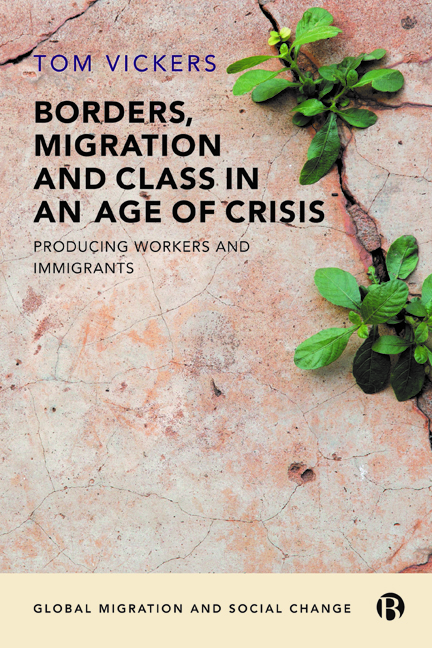Book contents
- Frontmatter
- Dedication
- Global Migration and Social Change
- Contents
- List of Figures and Tables
- Acknowledgements
- Series Preface
- 1 Introduction
- 2 Imperialism, Migration and Class in the 21st Century
- 3 Deconstructing Migrant Crises in Europe
- 4 Deconstructing Welfare Crises
- 5 Mobility Power and Labour Power in the Crisis of Imperialism
- 6 Deconstructing Migrant/Worker Categories in Britain
- 7 Conclusion
- Appendix: Methodology
- References
- Index
7 - Conclusion
Published online by Cambridge University Press: 30 April 2022
- Frontmatter
- Dedication
- Global Migration and Social Change
- Contents
- List of Figures and Tables
- Acknowledgements
- Series Preface
- 1 Introduction
- 2 Imperialism, Migration and Class in the 21st Century
- 3 Deconstructing Migrant Crises in Europe
- 4 Deconstructing Welfare Crises
- 5 Mobility Power and Labour Power in the Crisis of Imperialism
- 6 Deconstructing Migrant/Worker Categories in Britain
- 7 Conclusion
- Appendix: Methodology
- References
- Index
Summary
Introduction: mobility struggles in an age of crisis
This book has argued that capitalism is inherently violent in its reliance on the coercion of millions of people to produce according to the demands of capital, on pain of destitution. This process relies on control over mobility, and struggles by workers to assert their needs often necessitate challenging that control, or exercising mobility power (see Chapters 1 and 5). Capitalism is organised according to national divisions in the control and operation of capital (see Chapter 2). States have arisen on this basis, and continue to play a central role in defending national fractions of capital and maintaining conditions for continued capital accumulation (see Chapters 2, 3 and 4).
The capitalist crisis shows no sign of ending. As Shafique (2018: 16–17) points out, ‘GDP [gross domestic product] growth in the UK is being driven by consumer spending enabled by borrowing, rather than business investment, stronger productivity and higher wages’; in other words, the apparent ‘recovery’ is built on sand. Accumulated consumer debt is projected to reach 47 per cent of household income by 2021, beyond the 45 per cent that preceded the crash in 2008. Brexit seems likely to intensify the capitalist crisis for Britain by undermining the international position of the city of London and the share of global surplus value that it captures for the ruling classes (see Chapter 2). The imperative to increase surplus value, intensified by the severity of the crisis, is driving new forms of exploitation, internationally and domestically, supported by the growth of precarity. Precarity represents a hidden labour reserve, and disciplines workers through insecurity (see Chapter 5). Increasing numbers of precarious workers face pressure to make the entirety of their time and mobility subject to the demands of capital, while also finding themselves responsible for their own reproduction and, in some cases, their own management. This precaritisation takes many forms, calling for a range of responses, but the struggle for mobility power is a common thread.
The sense of crisis is deeply felt among large sections of Britain’s population, what Bauman (2016: 23) describes as ‘floating insecurity in search of an anchor’, and has been channelled by the ruling classes to adapt their systems of domination.
- Type
- Chapter
- Information
- Borders, Migration and Class in an Age of CrisisProducing Workers and Immigrants, pp. 185 - 192Publisher: Bristol University PressPrint publication year: 2019



